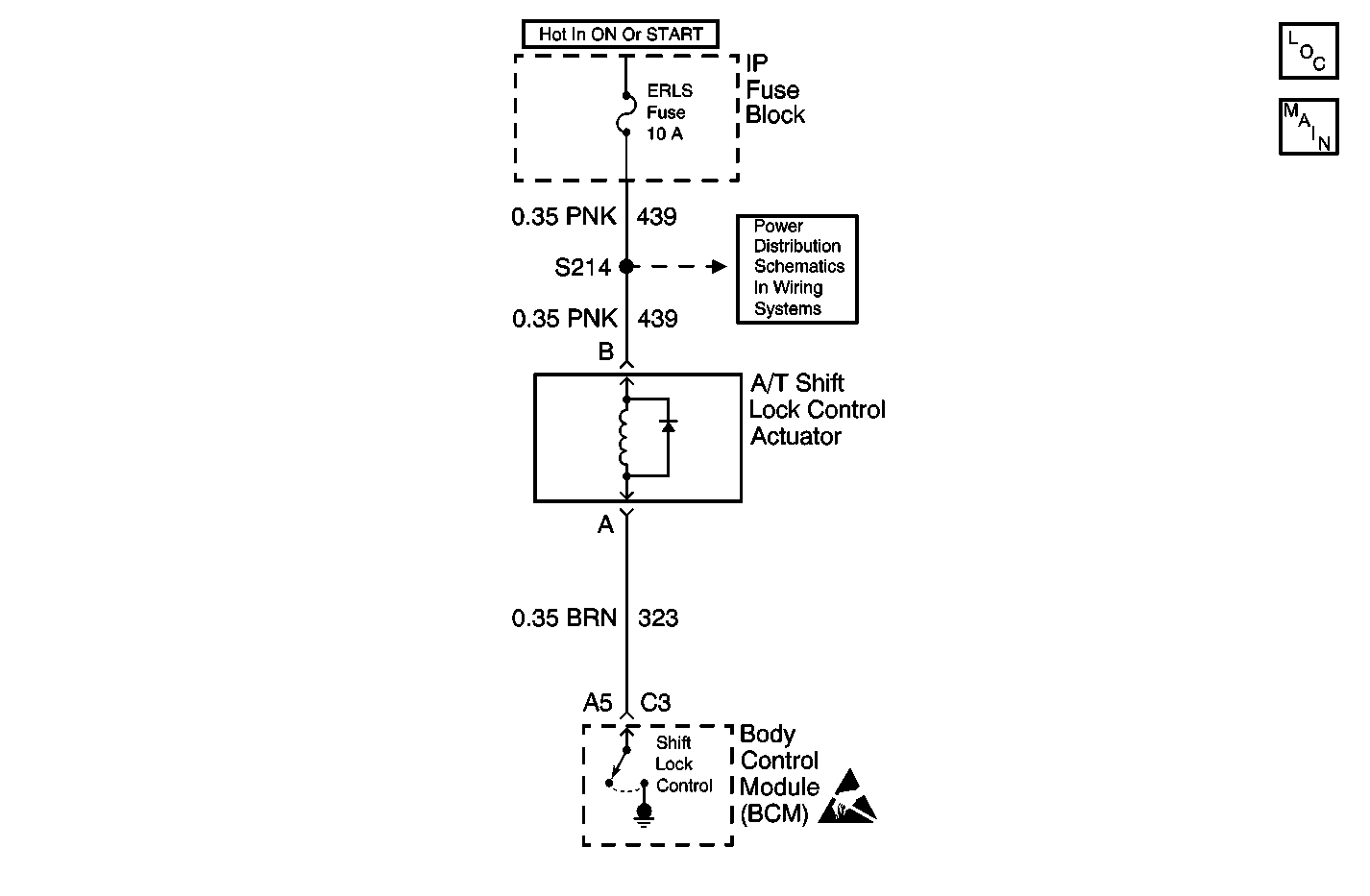
Circuit Description
The body control module (BCM) controls the A/T shift lock control solenoid. Positive voltage is supplied through the ERLS fuse through circuit 439 to terminal B of the A/T shift lock control solenoid. The BCM supplies a ground signal to the solenoid through circuit 323 to terminal A of the solenoid. When the brake pedal is depressed, the BCM removes the ground signal allowing the solenoid to disengage. This action allows the vehicle to be shifted out of park.
Conditions for Running the DTC
| • | The ignition switch is in the on position. |
| • | The brake pedal is depressed. |
Conditions for Setting the DTC
The shift lock control circuit is shorted to battery positive voltage for 1 second.
Action Taken When the DTC Sets
The BCM disables the A/T shift lock control output for the remainder of the ignition cycle.
Conditions for Clearing the DTC
| • | A current DTC B2708 will clear when the malfunction is no longer present and the ignition switch is cycled. |
| • | All BCM history codes will clear after 100 ignition cycles with no current codes active during the 100 ignition cycles. |
Diagnostic Aids
| • | If the shift lock control circuit is shorted to battery positive voltage, the A/T shift lock solenoid will be inoperative. The vehicle will shift out of park without depressing the brake pedal. |
| • | Perform the tests while wiggling the wires and connectors. This may often cause an intermittent malfunction to appear. |
Test Description
The number(s) below refer to the step number(s) on the diagnostic table.
-
Listen for an audible click when the A/T shift lock solenoid operates. Command both the ON and OFF states. Repeat the commands as necessary.
-
Tests for voltage at the coil side of the A/T shift lock solenoid. The ERLS fuse supplies power to the coil side of the A/T shift lock solenoid.
-
Verifies that the body control module is providing ground to the A/T shift lock solenoid.
-
Tests if ground is constantly being applied to the A/T shift lock solenoid.
Step | Action | Yes | No |
|---|---|---|---|
1 | Did you perform the Body Control System Diagnostic System Check? | Go to Step 2 | |
Does the A/T shift lock solenoid turn ON and OFF with each command? | Go to Testing for Intermittent Conditions and Poor Connections in Wiring Systems | Go to Step 3 | |
Does the test lamp illuminate? | Go to Step 4 | Go to Step 10 | |
Does the test lamp turn ON and OFF with each command? | Go to Step 8 | Go to Step 5 | |
Does the test lamp remain illuminated with each command? | Go to Step 7 | Go to Step 6 | |
6 | Test the control circuit of the A/T shift lock solenoid for a short to voltage. Refer to Circuit Testing and Wiring Repairs in Wiring Systems. Did you find and correct the condition? | Go to Step 13 | Go to Step 9 |
7 | Test the control circuit of the A/T shift lock solenoid for a short to ground. Refer to Circuit Testing and Wiring Repairs in Wiring Systems. Did you find and correct the condition? | Go to Step 13 | Go to Step 9 |
8 | Inspect for poor connections at the A/T shift lock solenoid. Refer to Testing for Intermittent Conditions and Poor Connections and Connector Repairs in Wiring Systems. Did you find and correct the condition? | Go to Step 13 | Go to Step 11 |
9 | Inspect for poor connections at the harness connector of the body control module. Refer to Testing for Intermittent Conditions and Poor Connections and Connector Repairs in Wiring Systems. Did you find and correct the condition? | Go to Step 13 | Go to Step 12 |
10 | Repair the coil side feed circuit of the A/T shift lock solenoid. Refer to Wiring Repairs in Wiring Systems. Did you complete the repair? | Go to Step 13 | -- |
11 | Replace the A/T shift lock solenoid. Did you complete the replacement? | Go to Step 13 | -- |
12 | Replace the body control module. Refer to Body Control Module Replacement in Body Control System. Important: Perform the set up procedure for the body control module. Refer to Body Control Module (BCM) Programming/RPO Configuration . Did you complete the replacement? | Go to Step 13 | -- |
13 |
Does the DTC reset? | Go to Step 2 | System OK |
